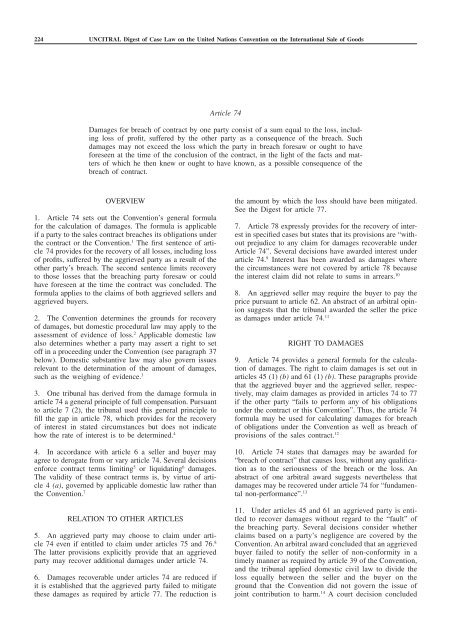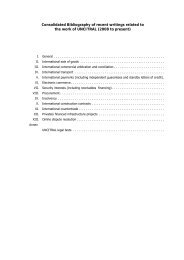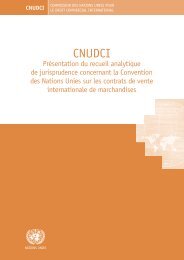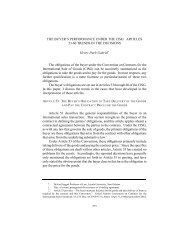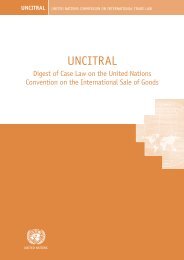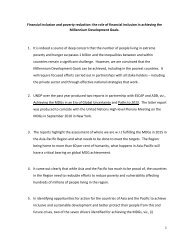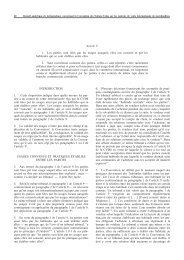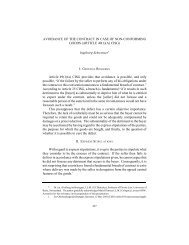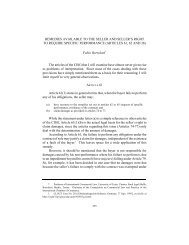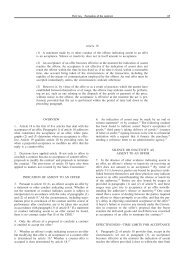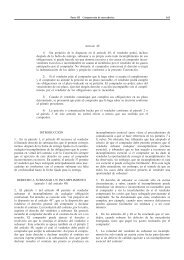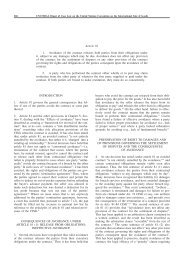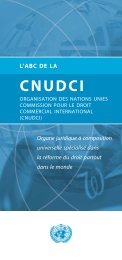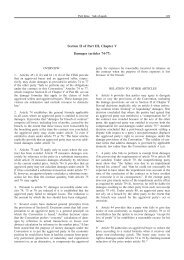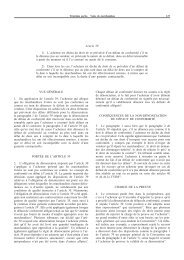Article 74 Damages for breach of contract by one party ... - UNCITRAL
Article 74 Damages for breach of contract by one party ... - UNCITRAL
Article 74 Damages for breach of contract by one party ... - UNCITRAL
You also want an ePaper? Increase the reach of your titles
YUMPU automatically turns print PDFs into web optimized ePapers that Google loves.
224 <strong>UNCITRAL</strong> Digest <strong>of</strong> Case Law on the United Nations Convention on the International Sale <strong>of</strong> Goods<br />
<strong>Article</strong> <strong>74</strong><br />
<strong>Damages</strong> <strong>for</strong> <strong>breach</strong> <strong>of</strong> <strong>contract</strong> <strong>by</strong> <strong>one</strong> <strong>party</strong> consist <strong>of</strong> a sum equal to the loss, including<br />
loss <strong>of</strong> pr<strong>of</strong>it, suffered <strong>by</strong> the other <strong>party</strong> as a consequence <strong>of</strong> the <strong>breach</strong>. Such<br />
damages may not exceed the loss which the <strong>party</strong> in <strong>breach</strong> <strong>for</strong>esaw or ought to have<br />
<strong>for</strong>eseen at the time <strong>of</strong> the conclusion <strong>of</strong> the <strong>contract</strong>, in the light <strong>of</strong> the facts and matters<br />
<strong>of</strong> which he then knew or ought to have known, as a possible consequence <strong>of</strong> the<br />
<strong>breach</strong> <strong>of</strong> <strong>contract</strong>.<br />
OVERVIEW<br />
1. <strong>Article</strong> <strong>74</strong> sets out the Convention’s general <strong>for</strong>mula<br />
<strong>for</strong> the calculation <strong>of</strong> damages. The <strong>for</strong>mula is applicable<br />
if a <strong>party</strong> to the sales <strong>contract</strong> <strong>breach</strong>es its obligations under<br />
the <strong>contract</strong> or the Convention. 1 The first sentence <strong>of</strong> article<br />
<strong>74</strong> provides <strong>for</strong> the recovery <strong>of</strong> all losses, including loss<br />
<strong>of</strong> pr<strong>of</strong>its, suffered <strong>by</strong> the aggrieved <strong>party</strong> as a result <strong>of</strong> the<br />
other <strong>party</strong>’s <strong>breach</strong>. The second sentence limits recovery<br />
to those losses that the <strong>breach</strong>ing <strong>party</strong> <strong>for</strong>esaw or could<br />
have <strong>for</strong>eseen at the time the <strong>contract</strong> was concluded. The<br />
<strong>for</strong>mula applies to the claims <strong>of</strong> both aggrieved sellers and<br />
aggrieved buyers.<br />
2. The Convention determines the grounds <strong>for</strong> recovery<br />
<strong>of</strong> damages, but domestic procedural law may apply to the<br />
assessment <strong>of</strong> evidence <strong>of</strong> loss. 2 Applicable domestic law<br />
also determines whether a <strong>party</strong> may assert a right to set<br />
<strong>of</strong>f in a proceeding under the Convention (see paragraph 37<br />
below). Domestic substantive law may also govern issues<br />
relevant to the determination <strong>of</strong> the amount <strong>of</strong> damages,<br />
such as the weighing <strong>of</strong> evidence. 3<br />
3. One tribunal has derived from the damage <strong>for</strong>mula in<br />
article <strong>74</strong> a general principle <strong>of</strong> full compensation. Pursuant<br />
to article 7 (2), the tribunal used this general principle to<br />
fill the gap in article 78, which provides <strong>for</strong> the recovery<br />
<strong>of</strong> interest in stated circumstances but does not indicate<br />
how the rate <strong>of</strong> interest is to be determined. 4<br />
4. In accordance with article 6 a seller and buyer may<br />
agree to derogate from or vary article <strong>74</strong>. Several decisions<br />
en<strong>for</strong>ce <strong>contract</strong> terms limiting 5 or liquidating 6 damages.<br />
The validity <strong>of</strong> these <strong>contract</strong> terms is, <strong>by</strong> virtue <strong>of</strong> article<br />
4 (a), governed <strong>by</strong> applicable domestic law rather than<br />
the Convention. 7<br />
RELATION TO OTHER ARTICLES<br />
5. An aggrieved <strong>party</strong> may choose to claim under article<br />
<strong>74</strong> even if entitled to claim under articles 75 and 76. 8<br />
The latter provisions explicitly provide that an aggrieved<br />
<strong>party</strong> may recover additional damages under article <strong>74</strong>.<br />
6. <strong>Damages</strong> recoverable under articles <strong>74</strong> are reduced if<br />
it is established that the aggrieved <strong>party</strong> failed to mitigate<br />
these damages as required <strong>by</strong> article 77. The reduction is<br />
the amount <strong>by</strong> which the loss should have been mitigated.<br />
See the Digest <strong>for</strong> article 77.<br />
7. <strong>Article</strong> 78 expressly provides <strong>for</strong> the recovery <strong>of</strong> interest<br />
in specified cases but states that its provisions are “without<br />
prejudice to any claim <strong>for</strong> damages recoverable under<br />
<strong>Article</strong> <strong>74</strong>”. Several decisions have awarded interest under<br />
article <strong>74</strong>. 9 Interest has been awarded as damages where<br />
the circumstances were not covered <strong>by</strong> article 78 because<br />
the interest claim did not relate to sums in arrears. 10<br />
8. An aggrieved seller may require the buyer to pay the<br />
price pursuant to article 62. An abstract <strong>of</strong> an arbitral opinion<br />
suggests that the tribunal awarded the seller the price<br />
as damages under article <strong>74</strong>. 11<br />
RIGHT TO DAMAGES<br />
9. <strong>Article</strong> <strong>74</strong> provides a general <strong>for</strong>mula <strong>for</strong> the calculation<br />
<strong>of</strong> damages. The right to claim damages is set out in<br />
articles 45 (1) (b) and 61 (1) (b). These paragraphs provide<br />
that the aggrieved buyer and the aggrieved seller, respectively,<br />
may claim damages as provided in articles <strong>74</strong> to 77<br />
if the other <strong>party</strong> “fails to per<strong>for</strong>m any <strong>of</strong> his obligations<br />
under the <strong>contract</strong> or this Convention”. Thus, the article <strong>74</strong><br />
<strong>for</strong>mula may be used <strong>for</strong> calculating damages <strong>for</strong> <strong>breach</strong><br />
<strong>of</strong> obligations under the Convention as well as <strong>breach</strong> <strong>of</strong><br />
provisions <strong>of</strong> the sales <strong>contract</strong>. 12<br />
10. <strong>Article</strong> <strong>74</strong> states that damages may be awarded <strong>for</strong><br />
“<strong>breach</strong> <strong>of</strong> <strong>contract</strong>” that causes loss, without any qualification<br />
as to the seriousness <strong>of</strong> the <strong>breach</strong> or the loss. An<br />
abstract <strong>of</strong> <strong>one</strong> arbitral award suggests nevertheless that<br />
damages may be recovered under article <strong>74</strong> <strong>for</strong> “fundamental<br />
non-per<strong>for</strong>mance”. 13<br />
11. Under articles 45 and 61 an aggrieved <strong>party</strong> is entitled<br />
to recover damages without regard to the “fault” <strong>of</strong><br />
the <strong>breach</strong>ing <strong>party</strong>. Several decisions consider whether<br />
claims based on a <strong>party</strong>’s negligence are covered <strong>by</strong> the<br />
Convention. An arbitral award concluded that an aggrieved<br />
buyer failed to notify the seller <strong>of</strong> non-con<strong>for</strong>mity in a<br />
timely manner as required <strong>by</strong> article 39 <strong>of</strong> the Convention,<br />
and the tribunal applied domestic civil law to divide the<br />
loss equally between the seller and the buyer on the<br />
ground that the Convention did not govern the issue <strong>of</strong><br />
joint contribution to harm. 14 A court decision concluded
Part three. Sale <strong>of</strong> goods 225<br />
that the Convention did not cover a claim that the alleged<br />
seller had made a negligent misrepresentation inducing the<br />
conclusion <strong>of</strong> the sales <strong>contract</strong>. 15<br />
12. When an aggrieved buyer fails, without excuse, 16 to<br />
give timely notice to a <strong>breach</strong>ing seller in accordance with<br />
articles 39 or 43, the aggrieved buyer loses its right to rely<br />
on the seller’s <strong>breach</strong> when making a claim <strong>for</strong> damages. 17<br />
Under article 44 <strong>of</strong> the Convention, however, if the buyer<br />
has a “reasonable excuse” <strong>for</strong> failing to give the required<br />
notice, the aggrieved buyer may nevertheless recover damages<br />
other than lost pr<strong>of</strong>its. 18<br />
13. <strong>Article</strong> 79 excuses a <strong>breach</strong>ing <strong>party</strong> from the payment<br />
<strong>of</strong> damages (but not from other remedies <strong>for</strong> nonper<strong>for</strong>mance)<br />
if he proves that his non-per<strong>for</strong>mance was<br />
due to an impediment that satisfies the conditions <strong>of</strong> paragraph<br />
(1) <strong>of</strong> article 79. Paragraph (4) <strong>of</strong> article 79 provides,<br />
however, that the <strong>breach</strong>ing <strong>party</strong> will be liable <strong>for</strong> damages<br />
resulting from the other <strong>party</strong>’s non-receipt <strong>of</strong> a timely<br />
notice <strong>of</strong> the impediment and its effects.<br />
14. <strong>Article</strong> 80 provides that an aggrieved <strong>party</strong> may not rely<br />
on a <strong>breach</strong> <strong>by</strong> the other <strong>party</strong> to the extent that the <strong>breach</strong><br />
was caused <strong>by</strong> the aggrieved <strong>party</strong>’s act or omission.<br />
TYPES OF LOSSES<br />
15. The first sentence <strong>of</strong> article <strong>74</strong> provides that an<br />
aggrieved <strong>party</strong>’s damages consist <strong>of</strong> a m<strong>one</strong>tary sum to<br />
compensate him <strong>for</strong> “loss, including loss <strong>of</strong> pr<strong>of</strong>it, suffered<br />
. . . as a consequence <strong>of</strong> the <strong>breach</strong>”. Except <strong>for</strong> the explicit<br />
inclusion <strong>of</strong> lost pr<strong>of</strong>its, article <strong>74</strong> does not otherwise classify<br />
losses. Decisions sometimes refer to the classification<br />
<strong>of</strong> damages under domestic law. 19 It has been held that a<br />
buyer who has received non-con<strong>for</strong>ming goods and has not<br />
avoided the <strong>contract</strong> is entitled to recover damages under<br />
article <strong>74</strong> measured <strong>by</strong> the difference between the value <strong>of</strong><br />
the goods the buyer <strong>contract</strong>ed <strong>for</strong> and the value <strong>of</strong> the<br />
non-con<strong>for</strong>ming goods that were actually delivered. 20<br />
– Losses arising from death or personal injury<br />
16. <strong>Article</strong> 5 provides that losses arising from death or<br />
personal injury are excluded from the Convention’s coverage.<br />
However, when deciding on its jurisdiction, <strong>one</strong> court<br />
implicitly assumed that the Convention covers claims <strong>by</strong> a<br />
buyer against its seller <strong>for</strong> indemnification against claims<br />
<strong>by</strong> a sub-buyer <strong>for</strong> personal injury. 21<br />
– Losses arising from damage to other property<br />
17. <strong>Article</strong> 5 does not exclude losses <strong>for</strong> damage to property<br />
other than the goods purchased. 22<br />
– Losses arising from damage to<br />
non-material interests<br />
18. <strong>Article</strong> <strong>74</strong> does not exclude losses arising from damage<br />
to non-material interests, such as the loss <strong>of</strong> an<br />
aggrieved <strong>party</strong>’s reputation because <strong>of</strong> the other <strong>party</strong>’s<br />
<strong>breach</strong>. Some decisions have implicitly recognized the right<br />
to recover damages <strong>for</strong> loss <strong>of</strong> reputation or good will, 23<br />
but at least <strong>one</strong> decision has denied such recovery under<br />
the Convention. 24 One court found claims <strong>for</strong> both loss <strong>of</strong><br />
turnover and loss <strong>of</strong> reputation to be inconsistent. 25<br />
– Losses arising from change in value <strong>of</strong> m<strong>one</strong>y<br />
19. <strong>Article</strong> <strong>74</strong> provides <strong>for</strong> recovery <strong>of</strong> “a sum equal to<br />
the loss” but does not expressly state whether this <strong>for</strong>mula<br />
covers losses that result from changes in the value <strong>of</strong><br />
m<strong>one</strong>y. Several courts have recognized that an aggrieved<br />
<strong>party</strong> may suffer losses as a result <strong>of</strong> non-payment or delay<br />
in the payment <strong>of</strong> m<strong>one</strong>y. These losses may arise from<br />
fluctuations in currency exchange rates or devaluation <strong>of</strong><br />
the currency <strong>of</strong> payment. Tribunals differ as to the appropriate<br />
solution. Several decisions have awarded damages to<br />
reflect currency devaluation 26 or changes in the cost <strong>of</strong> living.<br />
27 On the other hand, several other decisions refused to<br />
award damages <strong>for</strong> such losses. One decision concluded<br />
that a claimant that is to receive payment in its own currency<br />
is generally not entitled to recover losses from currency<br />
devaluation, but went on to suggest that a claimant<br />
might recover damages <strong>for</strong> currency devaluations if it was<br />
to be paid in <strong>for</strong>eign currency and it had a practice <strong>of</strong><br />
converting such currency immediately after payment. 28<br />
Another court stated that while devaluation <strong>of</strong> the currency<br />
in which the price was to be paid could give rise to damages<br />
recoverable under the Convention, no damages could<br />
be awarded in the case be<strong>for</strong>e it because future losses could<br />
be awarded only when the loss can be estimated. 29<br />
EXPENDITURES BY AGGRIEVED PARTY<br />
20. Many decisions have recognized the right <strong>of</strong> an<br />
aggrieved <strong>party</strong> to recover reasonable expenditures incurred<br />
in preparation <strong>for</strong> or as a consequence <strong>of</strong> a <strong>contract</strong> that<br />
has been <strong>breach</strong>ed. The second sentence <strong>of</strong> article <strong>74</strong> limits<br />
recovery to the total amount <strong>of</strong> losses the <strong>breach</strong>ing <strong>party</strong><br />
could <strong>for</strong>esee at the time the <strong>contract</strong> was concluded (see<br />
paragraphs 32-34 below). Although the Convention does<br />
not expressly require that expenditures be reasonable several<br />
decisions have refused to award damages when the<br />
expenditures were unreasonable. 30<br />
21. Decisions have awarded incidental damages to an<br />
aggrieved buyer who had made reasonable expenditures <strong>for</strong><br />
the following purposes: inspection <strong>of</strong> non-con<strong>for</strong>ming<br />
goods; 31 handling and storing non-con<strong>for</strong>ming goods; 32 preserving<br />
goods; 33 shipping and customs costs incurred when<br />
returning the goods; 34 expediting shipment <strong>of</strong> substitute<br />
goods under an existing <strong>contract</strong> with a third <strong>party</strong>; 35 installing<br />
substitute goods; 36 sales and marketing costs; 37 commissions;<br />
38 hiring a third <strong>party</strong> to process goods; 39 obtaining<br />
credit; 40 delivering and taking back the non-con<strong>for</strong>ming<br />
goods to and from a sub-buyer; 41 reimbursing sub-buyers<br />
on account <strong>of</strong> non-con<strong>for</strong>ming goods; 42 moving replacement<br />
coal from stockpiles; 43 loss incurred in sub-chartering<br />
a ship that had been chartered to transport goods under a<br />
<strong>contract</strong> that the seller properly avoided. 44 Several decisions<br />
have awarded buyers who took delivery <strong>of</strong> non-con<strong>for</strong>ming
226 <strong>UNCITRAL</strong> Digest <strong>of</strong> Case Law on the United Nations Convention on the International Sale <strong>of</strong> Goods<br />
goods the reasonable costs <strong>of</strong> repair as damages. 45 At least<br />
<strong>one</strong> decision implicitly recognizes that an aggrieved buyer<br />
may recover incidental damages, although in the particular<br />
case the buyer failed to establish such damages. 46 Another<br />
decision assumed that the Convention governed a buyer’s<br />
claim <strong>for</strong> indemnification <strong>for</strong> expenses incurred in reimbursing<br />
a sub-buyer <strong>for</strong> personal injury caused to an<br />
employee. 47<br />
22. Decisions may recognize that an aggrieved buyer may<br />
recover <strong>for</strong> particular types <strong>of</strong> expenditure but deny recovery<br />
in a particular case. Some decisions explicitly recognize<br />
that recovery is possible <strong>for</strong> the type <strong>of</strong> expenditure but<br />
deny recovery <strong>for</strong> failure <strong>of</strong> pro<strong>of</strong>, lack <strong>of</strong> causation, or<br />
their un<strong>for</strong>eseeability <strong>by</strong> the <strong>breach</strong>ing <strong>party</strong>. Thus <strong>one</strong><br />
decision recognized the potential recovery <strong>of</strong> a buyer’s<br />
advertising costs but declined to award damages because<br />
the buyer failed to carry its burden <strong>of</strong> pro<strong>of</strong>. 48 Other decisions<br />
may implicitly assume the right to recover particular<br />
expenditures. When deciding on its jurisdiction, <strong>one</strong> court<br />
implicitly assumed that the Convention covers claims <strong>by</strong> a<br />
buyer against its seller <strong>for</strong> indemnification <strong>of</strong> a sub-buyer’s<br />
claim <strong>for</strong> personal injury. 49<br />
23. Aggrieved sellers have recovered damages <strong>for</strong> the following<br />
incidental expenses: storage <strong>of</strong> goods at the port <strong>of</strong><br />
shipment following the buyer’s anticipatory <strong>breach</strong>; 50 storage<br />
and preservation <strong>of</strong> undelivered machinery; 51 the cost<br />
<strong>of</strong> modifying a machine in order to resell it; 52 costs related<br />
to the dishonour <strong>of</strong> the buyer’s cheques. 53 A seller who has<br />
delivered non-con<strong>for</strong>ming goods and subsequently cures<br />
the non-con<strong>for</strong>mity is not entitled to recover the cost <strong>of</strong><br />
cure. 54<br />
– Expenditures <strong>for</strong> debt collection; attorney’s fees<br />
24. Decisions are split on whether the cost <strong>of</strong> using a debt<br />
collection agency other than a lawyer may be recovered as<br />
damages. One decision awarded the seller the cost, 55 but<br />
several other decisions state that an aggrieved <strong>party</strong> may<br />
not recover compensation <strong>for</strong> the cost <strong>of</strong> hiring a debt collection<br />
agency because the Convention does not cover such<br />
expenses. 56<br />
25. A number <strong>of</strong> courts and arbitral tribunals have considered<br />
whether an aggrieved <strong>party</strong> may recover the costs<br />
<strong>of</strong> a lawyer hired to collect a debt arising from a sales<br />
<strong>contract</strong>. Several decisions award damages to compensate<br />
<strong>for</strong> legal fees <strong>for</strong> extra-judicial acts such as the sending <strong>of</strong><br />
collection letters. 57 One decision distinguished between the<br />
extra-judicial fees <strong>of</strong> a lawyer in the <strong>for</strong>um and similar fees<br />
<strong>of</strong> a lawyer in another jurisdiction it included the fees <strong>of</strong><br />
the <strong>for</strong>mer in the allocation <strong>of</strong> litigation costs under the<br />
<strong>for</strong>um’s rules and awarded the fees <strong>of</strong> the latter as damages<br />
under article <strong>74</strong> <strong>of</strong> the Convention. 58<br />
26. Decisions are split as to whether attorney’s fees <strong>for</strong><br />
litigation may be awarded as damages under article <strong>74</strong>. 59<br />
Citing article <strong>74</strong>, several arbitral tribunals have awarded<br />
recovery <strong>of</strong> attorney’s fees <strong>for</strong> the arbitration proceedings. 60<br />
In a carefully reas<strong>one</strong>d award, another arbitral tribunal concluded<br />
that a supplemental interpretation <strong>of</strong> the arbitration<br />
clause <strong>by</strong> reference to both article <strong>74</strong> and local procedural<br />
law authorized the award <strong>of</strong> attorney’s fees be<strong>for</strong>e a tribunal<br />
consisting <strong>of</strong> lawyers. 61 Another court stated that, in principle,<br />
legal costs could be recovered, although the court<br />
denied them in the particular case. 62 Many cases award<br />
attorney’s fees without indicating whether the award is <strong>for</strong><br />
damages calculated under article <strong>74</strong> or is made pursuant<br />
to the tribunal’s rules on the allocation <strong>of</strong> legal fees. 63 Several<br />
decisions have limited or denied recovery <strong>of</strong> the amount<br />
<strong>of</strong> the claimant’s attorney’s fees on the grounds that the<br />
fees incurred were un<strong>for</strong>eseeable 64 or that the aggrieved<br />
<strong>party</strong> had failed to mitigate these expenses as required <strong>by</strong><br />
article 77. 65 An appellate court in the United States reversed<br />
a decision awarding attorney’s fees as damages under article<br />
<strong>74</strong> on the ground, inter alia, that the Convention did<br />
not implicitly overturn the “American rule” that the parties<br />
to litigation normally bear their own legal expenses, including<br />
attorneys’ fees. 66 LOST PROFITS<br />
27. The first sentence <strong>of</strong> article <strong>74</strong> expressly states that<br />
damages <strong>for</strong> losses include lost pr<strong>of</strong>its. Many decisions<br />
have awarded the aggrieved <strong>party</strong> lost pr<strong>of</strong>its 67 . When calculating<br />
lost pr<strong>of</strong>its, fixed costs (as distinguished from variable<br />
costs incurred in connection with fulfilling the specific<br />
<strong>contract</strong>) are not to be deducted from the sales price. 68 One<br />
decision awarded a seller who had been unable to resell<br />
the goods the difference between the <strong>contract</strong> price and the<br />
current value <strong>of</strong> those goods. 69<br />
28. The second sentence <strong>of</strong> article <strong>74</strong> limits the damages<br />
that can be awarded <strong>for</strong> losses caused <strong>by</strong> the <strong>breach</strong> to<br />
losses that the <strong>breach</strong>ing <strong>party</strong> <strong>for</strong>esaw or should have <strong>for</strong>eseen<br />
at the time the <strong>contract</strong> was concluded. One decision<br />
reduced the recovery <strong>of</strong> pr<strong>of</strong>its because the <strong>breach</strong>ing seller<br />
was not aware <strong>of</strong> the terms <strong>of</strong> the buyer’s <strong>contract</strong> with its<br />
sub-buyer. 70<br />
29. <strong>Damages</strong> <strong>for</strong> lost pr<strong>of</strong>its will <strong>of</strong>ten require predictions<br />
<strong>of</strong> future prices <strong>for</strong> the goods or otherwise involve some<br />
uncertainty as to actual future losses. <strong>Article</strong> <strong>74</strong> does not<br />
address the certainty with which these losses must be<br />
proved. One decision required the claimant to establish the<br />
amount <strong>of</strong> the loss according to the <strong>for</strong>um’s “procedural”<br />
standards as to the certainty <strong>of</strong> the amount <strong>of</strong> damages. 71<br />
30. Evidence <strong>of</strong> loss <strong>of</strong> pr<strong>of</strong>its, according to <strong>one</strong> decision,<br />
might include evidence <strong>of</strong> orders from customers that the<br />
buyer could not fill, evidence that customers had ceased to<br />
deal with the buyer, and evidence <strong>of</strong> loss <strong>of</strong> reputation as<br />
well as evidence that the <strong>breach</strong>ing seller knew or should<br />
have known <strong>of</strong> these losses. 72<br />
– <strong>Damages</strong> <strong>for</strong> “lost volume” sales<br />
31. In principle, an aggrieved seller who resells the goods<br />
suffers the loss <strong>of</strong> a sale when he has the capacity and<br />
market to sell similar goods to other persons because, without<br />
the buyer’s <strong>breach</strong>, he would have been able to make<br />
two sales. Under these circumstances a court has concluded<br />
that the seller was entitled to recover the lost pr<strong>of</strong>it from<br />
the first sale. 73 Another court, however, rejected a claim <strong>for</strong>
Part three. Sale <strong>of</strong> goods 227<br />
a “lost sale” because it did not appear that that the seller<br />
had been planning to make a second sale at the time the<br />
<strong>breach</strong>ed <strong>contract</strong> was negotiated. <strong>74</strong> An aggrieved buyer<br />
may have a similar claim to damages. A court concluded<br />
that a buyer could recover <strong>for</strong> damages caused <strong>by</strong> its inability<br />
to meet the market demand <strong>for</strong> its product as a result<br />
<strong>of</strong> the seller’s delivery <strong>of</strong> non-con<strong>for</strong>ming comp<strong>one</strong>nts. 75<br />
FORESEEABILITY<br />
32. The second sentence <strong>of</strong> article <strong>74</strong> limits recovery <strong>of</strong><br />
damages to those losses that the <strong>breach</strong>ing <strong>party</strong> <strong>for</strong>esaw<br />
or could have <strong>for</strong>eseen at the time the <strong>contract</strong> was concluded<br />
as a possible consequence <strong>of</strong> its <strong>breach</strong>. It has been<br />
noted that it is the possible consequences <strong>of</strong> a <strong>breach</strong>, not<br />
whether a <strong>breach</strong> would occur or the type <strong>of</strong> <strong>breach</strong>, that<br />
is subject to the <strong>for</strong>eseeability requirement <strong>of</strong> article <strong>74</strong>;<br />
and it has been suggested that article <strong>74</strong> does not demand<br />
that the specific details <strong>of</strong> the loss or the precise amount<br />
<strong>of</strong> the loss be <strong>for</strong>eseeable. 76<br />
33. Decisions have found that the <strong>breach</strong>ing <strong>party</strong> could<br />
not have <strong>for</strong>eseen the following losses: rental <strong>of</strong> machinery<br />
<strong>by</strong> buyer’s sub-buyer; 77 processing goods in a different<br />
country following late delivery; 78 an exceptionally large<br />
payments to freight <strong>for</strong>warder; 79 attorney’s fees in dispute<br />
with freight <strong>for</strong>warder; 80 the cost <strong>of</strong> resurfacing a grinding<br />
machine where that cost exceeded price <strong>of</strong> wire to be<br />
ground; 81 lost pr<strong>of</strong>its where <strong>breach</strong>ing seller did not know<br />
terms <strong>of</strong> <strong>contract</strong> with sub-buyer; 82 the cost <strong>of</strong> inspecting<br />
the goods in the importing country rather than exporting<br />
country. 83<br />
34. On the other hand, several decisions have explicitly<br />
found that claimed damages were <strong>for</strong>eseeable. One decision<br />
states that the seller <strong>of</strong> goods to a retail buyer should <strong>for</strong>esee<br />
that the buyer would resell the good, 84 while an arbitration<br />
tribunal found that a <strong>breach</strong>ing seller could have<br />
<strong>for</strong>eseen the buyer’s losses because the parties had corresponded<br />
extensively on supply problems. 85 Another decision<br />
concluded that a <strong>breach</strong>ing buyer who failed to pay<br />
the price in advance, as required <strong>by</strong> the <strong>contract</strong>, could<br />
<strong>for</strong>esee that an aggrieved seller <strong>of</strong> fungible goods would<br />
lose its typical pr<strong>of</strong>it margin. 86 A majority <strong>of</strong> another court<br />
awarded ten per cent <strong>of</strong> the price as damages to a seller<br />
who had manufactured the goods to the special order <strong>of</strong><br />
the buyer; the majority noted that a <strong>breach</strong>ing buyer could<br />
expect such a seller’s pr<strong>of</strong>it margin. 87 It has also been held<br />
that a buyer could <strong>for</strong>esee that its failure to establish a<br />
letter <strong>of</strong> credit as required <strong>by</strong> the sales <strong>contract</strong> would leave<br />
the seller with a chartered vessel, intended to transport the<br />
goods, that it could not use; the loss the seller incurred in<br />
sub-chartering that vessel was thus recoverable under article<br />
<strong>74</strong>. 88<br />
BURDEN AND STANDARD OF PROOF<br />
35. Although n<strong>one</strong> <strong>of</strong> the damage <strong>for</strong>mulae in articles <strong>74</strong>,<br />
75 and 76 expressly allocates the burden <strong>of</strong> pro<strong>of</strong>, those<br />
decisions that address the issue agree, more or less<br />
expressly, that the <strong>party</strong> making the claim bears the burden<br />
<strong>of</strong> establishing its claim. 89 One court gave effect to a<br />
national law rule that, if a <strong>breach</strong>ing seller acknowledges<br />
defects in the delivered goods, the burden <strong>of</strong> establishing<br />
that the goods con<strong>for</strong>med to the <strong>contract</strong> shifts to the<br />
seller. 90 Another decision expressly placed the burden <strong>of</strong><br />
establishing damages on the claimant. 91<br />
36. Several decisions state that domestic procedural and<br />
evidentiary law rather than the Convention governs the<br />
standard <strong>of</strong> pro<strong>of</strong> and the weight to be given evidence when<br />
determining damages. 92<br />
SET OFF<br />
37. Although the Convention does not address the issue<br />
<strong>of</strong> whether a counterclaim may be set <strong>of</strong>f against a claim<br />
under the Convention, 93 the Convention does determine<br />
whether a counterclaim arising from a sales <strong>contract</strong> exists 94<br />
and, if it does, the counterclaim may then be subject to set<br />
<strong>of</strong>f against a claim arising under the Convention. 95<br />
JURISDICTION; PLACE OF PAYMENT OF<br />
DAMAGES<br />
38. Several decisions have concluded that, <strong>for</strong> the purpose<br />
<strong>of</strong> determining jurisdiction, damages <strong>for</strong> <strong>breach</strong> <strong>of</strong> <strong>contract</strong><br />
are payable at the claimant’s place <strong>of</strong> business. 96<br />
Notes<br />
1<br />
<strong>Article</strong>s 45 (1) (b) and 61 (1) (b) provide that the aggrieved buyer and the aggrieved seller, respectively, may recover damages as<br />
provided in articles <strong>74</strong> to 77 if the other <strong>party</strong> fails to per<strong>for</strong>m as required <strong>by</strong> the <strong>contract</strong> or the Convention.<br />
2<br />
Helsingin hoviokeus [Helsinki Court <strong>of</strong> Appeals], Finland, 26 October 2000, available in English translation on the Internet at http://<br />
cisgw3.law.pace.edu/cases/001026f5.html (grounds <strong>for</strong> recovery determined under the CISG but calculation <strong>of</strong> damages made under<br />
article 17 <strong>of</strong> the Finnish Law <strong>of</strong> Civil Procedure); CLOUT case No. 261 [Bezirksgericht der Sanne, Switzerland, 20 February 1997]<br />
(applicable domestic law determines how to calculate damages when amount cannot be determined); CLOUT case No. 85 [Federal District<br />
Court, Northern District <strong>of</strong> New York, United States, 9 September 1994] (referring to “sufficient evidence [under common law and<br />
law <strong>of</strong> New York] to estimate the amount <strong>of</strong> damages with reasonable certainty”), affirmed CLOUT case No. 138 [Federal Court <strong>of</strong><br />
Appeals <strong>for</strong> the Second Circuit, United States, 6 December 1993, 3 March 1995].<br />
3<br />
See, e.g., CLOUT case No. 377 [Landgericht Flensburg, Germany, 24 March 1999] (aggrieved seller recovers damages under article <strong>74</strong><br />
<strong>for</strong> losses caused <strong>by</strong> the buyer’s delay in payment but applicable domestic law determines whether payment was delayed because Convention<br />
is silent on time <strong>of</strong> payment).
228 <strong>UNCITRAL</strong> Digest <strong>of</strong> Case Law on the United Nations Convention on the International Sale <strong>of</strong> Goods<br />
4<br />
CLOUT case No. 93 [Arbitration—Internationales Schiedsgericht der Bundeskammer der gewerblichen Wirtschaft—Wien, 15 June<br />
1994] (deriving general principle from article <strong>74</strong> <strong>for</strong> purposes <strong>of</strong> filling gap in article 78, in accordance with article 7 (2)). See also<br />
CLOUT case No. 138 [Federal Court <strong>of</strong> Appeals <strong>for</strong> the Second Circuit, United States, 6 December 1993, 3 March 1995] (article <strong>74</strong> is<br />
“designed to place the aggrieved <strong>party</strong> in as good a position as if the other <strong>party</strong> had properly per<strong>for</strong>med the <strong>contract</strong>”) (see full text<br />
<strong>of</strong> the decision).<br />
5<br />
Hovioikeus Turku, Finland, 12 April 2002, available (in English translation) on the Internet at http://cisgw3.law.pace.edu/cases/<br />
020412f5.html (<strong>contract</strong> term limiting recovery <strong>of</strong> damages is en<strong>for</strong>ceable).<br />
6<br />
Tribunal <strong>of</strong> International Commercial Arbitration at the Russian Federation Chamber <strong>of</strong> Commerce and Industry, Russia, award in<br />
case No. 302/1996, 27 July 1999, published in Rozenberg, Practika <strong>of</strong> Mejdunarodnogo Commercheskogo Arbitrajnogo Syda: Haychno-<br />
Practicheskiy Commentariy Moscow (1999–2000) No. 27 [141–147] (liquidated damage clause displaces remedy <strong>of</strong> specific per<strong>for</strong>mance;<br />
amount <strong>of</strong> liquidated damages was reasonable and <strong>for</strong>eseeable under article <strong>74</strong> as measure <strong>of</strong> expected pr<strong>of</strong>it); Tribunal <strong>of</strong> International<br />
Commercial Arbitration at the Russian Federation Chamber <strong>of</strong> Commerce and Industry, Russia, award in case No. 251/93 <strong>of</strong> 23 November<br />
1994, Unilex (damages <strong>for</strong> delay granted only to extent <strong>of</strong> <strong>contract</strong> penalty <strong>for</strong> delay clause).<br />
7<br />
See CLOUT case No. 318 [Oberlandesgericht Celle, Germany, 2 September 1998] (term in seller’s general conditions limiting damages<br />
not validly incorporated into <strong>contract</strong>) (see full text <strong>of</strong> the decision); CLOUT case No. 345 [Landgericht Heilbronn, Germany,<br />
15 September 1997] (validity <strong>of</strong> standard term excluding liability determined <strong>by</strong> domestic law, but reference in domestic law to nonmandatory<br />
rule replaced <strong>by</strong> reference to equivalent Convention provision).<br />
8<br />
CLOUT case No. 427 [Oberster Gerichtsh<strong>of</strong>, Austria, 28 April 2000] (aggrieved <strong>party</strong> may claim under article <strong>74</strong> even if it could<br />
also claim under articles 75 or 76). See also CLOUT case No. 140 [Tribunal <strong>of</strong> International Commercial Arbitration at the Russian<br />
Federation Chamber <strong>of</strong> Commerce and Industry, Russia, award in case No. 155/1994 <strong>of</strong> 16 March 1995] (citing article <strong>74</strong>, the tribunal<br />
awarded buyer the difference between <strong>contract</strong> price and price in substitute purchase) ; CLOUT case No. 93 [Arbitration—Internationales<br />
Schiedsgericht der Bundeskammer der gewerblichen Wirtschaft—Wien, Austria, 15 June 1994] (awarding seller, without citation <strong>of</strong> specific<br />
Convention article, difference between <strong>contract</strong> price and price in substitute transaction).<br />
9<br />
See, e.g., Van Dongen Waalwijk Leder BV v. Conceria Adige S.p.A., Gerechtsh<strong>of</strong> ’s-Hertogenbosch, the Netherlands, 20 October 1997,<br />
Unilex (interest awarded under both articles <strong>74</strong> and 78); Pretura di Torino, Italy, 30 January 1997, Unilex (aggrieved <strong>party</strong> entitled to<br />
statutory rate <strong>of</strong> interest plus additional interest it had established as damages under article <strong>74</strong>); also available on the Internet at http://<br />
www.cisg.law.pace.edu/cisg/wais/db/cases2/970130i3.html; CLOUT case No. 193 [Handelsgericht des Kantons Zürich, Switzerland, 10<br />
July 1996] (seller awarded interest under article <strong>74</strong> in amount charged on bank loan to seller that was needed because <strong>of</strong> buyer’s nonpayment);<br />
Amtsgericht Koblenz, Germany, 12 November 1996, available on the Internet at http://www.jura.uni-freiburg.de/ipr1/cisg/urteile/<br />
text/400.htm (bank certificate established that aggrieved seller was paying higher interest rate than <strong>of</strong>ficial rate under applicable law);<br />
Käräjäoikeus <strong>of</strong> Kuopio, Finland, 5 November 1996, available on the Internet at http://www.utu.fi/oik/tdk/xcisg/tap6.html (<strong>breach</strong>ing <strong>party</strong><br />
could <strong>for</strong>esee aggrieved <strong>party</strong> would incur interest charges, but not the actual rate <strong>of</strong> interest in Lithuania); CLOUT case No. 195 [Handelsgericht<br />
des Kantons Zürich, Switzerland, 21 September 1995] (seller entitled to higher interest under article <strong>74</strong> if he established<br />
damages caused <strong>by</strong> non-payment); CLOUT case No. 281 [Oberlandesgericht Koblenz, Germany, 17 September 1993]; CLOUT case<br />
No. 130 [Oberlandesgericht Düsseldorf, Germany, 14 January 1994] (damages includes interest paid <strong>by</strong> aggrieved seller on bank loans);<br />
CLOUT case No. 104 [Arbitration—International Chamber <strong>of</strong> Commerce No. 7197 1993] (interest awarded at commercial bank rate in<br />
Austria); Landgericht Berlin, Germany, 6 October 1992, available on the Internet at http://www.jura.uni-freiburg.de/ipr1/cisg/urteile/<br />
text/173.htm (assignee <strong>of</strong> aggrieved <strong>party</strong>’s claim entitled to recover 23% interest rate charged <strong>by</strong> assignee); CLOUT case No. 7 [Amtsgericht<br />
Oldenburg in Holstein, Germany, 24 April 1990] (seller recovered price and interest at the statutory rate in Italy plus additional<br />
interest as damages under article <strong>74</strong>). See also CLOUT case No. 377 [Landgericht Flensburg, Germany, 24 March 1999] (aggrieved<br />
<strong>party</strong> had right to recover damages under the Convention <strong>for</strong> losses resulting from delay in payment but applicable domestic law determines<br />
when delay becomes culpable); CLOUT case No. 409 [Landgericht Kassel, Germany, 15 February 1996] (failure to establish<br />
additional damages under article <strong>74</strong>); CLOUT case No. 132 [Oberlandesgericht Hamm, Germany, 8 February 1995] (claimant awarded<br />
statutory interest rate under article 78 but claimant failed to establish payment <strong>of</strong> higher interest rate <strong>for</strong> purposes <strong>of</strong> recovering damages<br />
under article <strong>74</strong>).<br />
10<br />
See, e.g., Stockholm Chamber <strong>of</strong> Commerce Arbitration Award, Sweden, 1998, Unilex (aggrieved buyer entitled to recover interest<br />
on reimbursable costs it incurred following sub-buyer’s rightful rejection <strong>of</strong> goods).<br />
11<br />
ICC award No. 8716, February 1997, (Fall 2000) ICC International Court <strong>of</strong> Arbitration Bulletin, vol. 11, No. 2, pp. 61-63 (damages<br />
awarded in amount <strong>of</strong> price).<br />
12<br />
See, e.g., CLOUT case No. 51 [Amtsgericht Frankfurt a.M., Germany, 31 January 1991] (seller’s failure to notify the buyer that the<br />
seller was suspending per<strong>for</strong>mance in accordance with article 71 (3) was itself a <strong>breach</strong> <strong>of</strong> the Convention entitling buyer to<br />
damages).<br />
13<br />
ICC award No. 8716, February 1997, (Fall 2000) ICC International Court <strong>of</strong> Arbitration Bulletin, vol. 11, No. 2, pp. 61-63.<br />
14<br />
Bulgarian Chamber <strong>of</strong> Commerce and Industry arbitration case No. 56/1995, Bulgaria, 24 April 1996, Unilex (setting a 50/50 division<br />
<strong>of</strong> the 10 percent <strong>of</strong> price held back <strong>by</strong> buyer because <strong>of</strong> non-con<strong>for</strong>mity <strong>of</strong> goods).<br />
15<br />
Geneva Pharmaceuticals Tech. Corp. v. Barr Laboratories, Inc., United States, 10 May 2002, Unilex (domestic law “tort” claim <strong>of</strong><br />
negligent misrepresentation not preempted <strong>by</strong> Convention). See also CLOUT case No. 420 [Federal District Court, Eastern District <strong>of</strong><br />
Pennsylvania, United States, 29 August 2000] (Convention does not govern non-<strong>contract</strong>ual claims).<br />
16<br />
See CISG arts. 40 (buyer’s failure is excused when seller could not have been unaware <strong>of</strong> non-con<strong>for</strong>mity and failed to disclose<br />
noncon<strong>for</strong>mity to buyer) and 44 (preserving spedified remedies <strong>for</strong> the buyer if he has “reasonable excuse” <strong>for</strong> failure to notify). See<br />
also CLOUT case No. 294 [Oberlandesgericht Bamberg, Germany, 13 January 1999] (buyer need not give notice declaring avoidance<br />
<strong>of</strong> <strong>contract</strong> when seller stated it would not per<strong>for</strong>m); CLOUT case No. 94 [Arbitration—Internationales Schiedsgericht der Bundeskammer<br />
der gewerblichen Wirtschaft—Wien, Austria, 15 June 1994] (seller estopped from asserting buyer’s failure to give timely notice).<br />
17<br />
See, e.g., CLOUT case No. 364 [Landgericht Köln, Germany, 30 November 1999] (failure to give sufficiently specific notice);<br />
CLOUT case No. 344 [Landgericht Erfurt, Germany, 29 July 1998] (failure to give sufficiently specific notice); CLOUT case No. 280
Part three. Sale <strong>of</strong> goods 229<br />
[Oberlandesgericht Jena, Germany, 26 May 1998] (failure to satisfy article 39 bars both CISG and tortious claims <strong>for</strong> damages); CLOUT<br />
case No. 282 [Oberlandesgericht Koblenz, Germany, 31 January 1997] (failure to give sufficiently specific notice); CLOUT case No. 196<br />
[Handelsgericht des Kantons Zürich, Switzerland, 26 April 1995] (failure to give timely notice); CLOUT case No. 192 [Obergericht des<br />
Kantons Luzern, Switzerland, 8 January 1997] (failure to give timely notice); CLOUT case No. 167 [Oberlandesgericht München, Germany,<br />
8 February 1995] (failure to notify); CLOUT case No. 82 [Oberlandesgericht Düsseldorf, Germany, 10 February 1994] (failure<br />
to notify); CLOUT case No. 50 [Landgericht Baden-Baden, Germany, 14 August 1991] (failure to give timely notice <strong>of</strong> non-con<strong>for</strong>mity);<br />
CLOUT case No. 4 [Landgericht Stuttgart, Germany, 31 August 1989] (failure to examine and notify <strong>of</strong> non-con<strong>for</strong>mity <strong>of</strong> goods).<br />
18<br />
CLOUT case No. 4<strong>74</strong> [Tribunal <strong>of</strong> International Commercial Arbitration at the Russian Federation Chamber <strong>of</strong> Commerce and<br />
Industry, Russia, award in case No. 54/1999 <strong>of</strong> 24 January 2000].<br />
19<br />
See, e.g., CLOUT case No. 427 [Oberster Gerichtsh<strong>of</strong>, Austria, 28 April 2000] (loss <strong>of</strong> pr<strong>of</strong>it in case was “positive damage”) (see<br />
full text <strong>of</strong> the decision); CLOUT case No. 138 [Federal Court <strong>of</strong> Appeals <strong>for</strong> the Second Circuit United States 6 December 1995]<br />
(“incidental and consequential” damages) (see full text <strong>of</strong> the decision) affirming CLOUT case No. 85 [Federal District Court, Northern<br />
District <strong>of</strong> New York, United States, 9 September 1994].<br />
20<br />
CLOUT case No. 596 [Oberlandesgericht Zweibrücken, Germany, 2 February 2004] (see full text <strong>of</strong> the decision).<br />
21<br />
CLOUT case No. 49 [Oberlandesgericht Düsseldorf, Germany, 2 July 1993].<br />
22<br />
See CLOUT case No. 196 [Handelsgericht des Kantons Zürich, Switzerland 26 April 1995] (recovery <strong>for</strong> damage to house in which<br />
a container <strong>for</strong> “weightless floating” installed).<br />
23<br />
Helsingin hoviokeus, Finland, 26 October 2000, available in English translation on the Internet at http://cisgw3.law.pace.edu/cases/<br />
001026f5.html (recovery <strong>of</strong> good will calculated in accordance with national rules <strong>of</strong> civil procedure); CLOUT case No. 331 [Handelsgericht<br />
des Kantons Zürich, Switzerland, 10 February 1999] (stating that article <strong>74</strong> includes recovery <strong>for</strong> loss <strong>of</strong> goodwill but aggrieved<br />
<strong>party</strong> did not substantiate claim) (see full text <strong>of</strong> the decision); CLOUT case No. 313 [Cour d’appel, Grenoble, France, 21 October 1999]<br />
(no recovery under CISG <strong>for</strong> loss <strong>of</strong> good will unless loss <strong>of</strong> business proved); CLOUT case No. 210 [Audienca Provincial Barcelona,<br />
Spain, 20 June 1997] (aggrieved <strong>party</strong> did not provide evidence showing loss <strong>of</strong> clients or loss <strong>of</strong> reputation) (see full text <strong>of</strong> the<br />
decision).<br />
24<br />
Tribunal <strong>of</strong> International Commercial Arbitration at the Russian Federation Chamber <strong>of</strong> Commerce, Russia, award in case No. 304/93,<br />
<strong>of</strong> 3 March 1995 (“moral harm” not compensable under CISG).<br />
25<br />
CLOUT case No. 343 [Landgericht Darmstadt, Germany 9 May 2000] (damaged reputation insignificant if there is no loss <strong>of</strong> turnover<br />
and consequent lost pr<strong>of</strong>its) (see full text <strong>of</strong> the decision).<br />
26<br />
Gruppo IMAR S.p.A. v. Protech Horst BV, Arrondissementsrechtbank Roermond, the Netherlands, 6 May 1993, Unilex (damages in<br />
amount <strong>of</strong> devaluation because payment not made when due).<br />
27<br />
See, e.g., Maglificio Dalmine s.l.r. v. S.C. Covires Tribunal commercial de Bruxelles, Belgium, 13 November 1992, Unilex (failure<br />
to pay price; court allowed revaluation <strong>of</strong> receivable under Italian law to reflect change in cost <strong>of</strong> living in seller’s country).<br />
28<br />
CLOUT case No. 130 [Oberlandesgericht Düsseldorf, Germany, 14 January 1994] (seller did not establish its loss from devaluation<br />
<strong>of</strong> currency in which price was to be paid).<br />
29<br />
CLOUT case No. 214 [Handelsgericht des Kantons Zürich, Switzerland, 5 February 1997] (citing general principle <strong>of</strong> tort law).<br />
30<br />
CLOUT case No. 541 [Oberster Gerichtsh<strong>of</strong>, Austria, 14 January 2002] (see full text <strong>of</strong> the decision); CLOUT case No. 235 [Bundesgerichtsh<strong>of</strong>,<br />
Germany, 25 June 1997] (expense <strong>of</strong> resurfacing grinding machine not reasonable in relation to price <strong>of</strong> wire to be ground);<br />
Tribunal <strong>of</strong> International Commercial Arbitration at the Russian Federation Chamber <strong>of</strong> Commerce, Russia, award in case No. 375/93<br />
<strong>of</strong> 9 September 1994 (recovery <strong>of</strong> storage expenses shown to be in amounts normally charged).<br />
31<br />
Stockholm Chamber <strong>of</strong> Commerce Arbitration Award, Sweden, 1998, Unilex (examination).<br />
32<br />
Stockholm Chamber <strong>of</strong> Commerce Arbitration Award, Sweden, 1998, Unilex (storage); CLOUT case No. 138 [Federal Court <strong>of</strong><br />
Appeals <strong>for</strong> the Second Circuit, United States, 6 December 1995] (reversing CLOUT case No. 85 decision that denied recovery <strong>of</strong> storage<br />
costs).<br />
33<br />
CLOUT case No. 304 [Arbitration—International Chamber <strong>of</strong> Commerce No. 7531 1994].<br />
34<br />
CLOUT case No. 138 [Federal Court <strong>of</strong> Appeals <strong>for</strong> the Second Circuit, United States, 6 December 1995] (reversing CLOUT case<br />
No. 85 decision that denied recovery <strong>of</strong> shipping costs and customs duties).<br />
35<br />
CLOUT case No. 138 [Federal Court <strong>of</strong> Appeals <strong>for</strong> the Second Circuit, United States, 6 December 1995] (affirming CLOUT case<br />
No. 85 decision that awarded costs <strong>of</strong> expediting shipment <strong>of</strong> goods under existing <strong>contract</strong>).<br />
36<br />
CLOUT case No. 125 [Oberlandesgericht Hamm, Germany, 9 June 1995].<br />
37<br />
Helsingin hoviokeus [Helsinki Court <strong>of</strong> Appeal], Finland, 26 October 2000, available in English translation on the Internet at http://<br />
cisgw3.law.pace.edu/cases/001026f5.html (damages recovered <strong>for</strong> sales and marketing expenses <strong>of</strong> aggrieved buyer).<br />
38<br />
CLOUT case No. 253 [Cant<strong>one</strong> del Ticino Tribunale d’appello, Switzerland, 15 January 1998] (commissions) (see full text <strong>of</strong> the<br />
decision).<br />
39<br />
CLOUT case No. 311 [Oberlandesgericht Köln, Germany, 8 January 1997].<br />
40<br />
CLOUT case No. 304 [Arbitration—International Chamber <strong>of</strong> Commerce No. 7531 1994].<br />
41<br />
CLOUT case No. 318 [Oberlandesgericht Celle, Germany, 2 September 1998] (recovery allowed <strong>for</strong> handling complaints and <strong>for</strong><br />
costs <strong>of</strong> unwrapping, loading and unloading returned non-con<strong>for</strong>ming goods from buyer’s customers); Stockholm Chamber <strong>of</strong> Commerce<br />
Arbitration Award, Sweden, 1998, Unilex (freight, insurance and duties connected with delivery to sub-buyer; storage with <strong>for</strong>warder;<br />
freight back to aggrieved buyer; storage be<strong>for</strong>e resale <strong>by</strong> aggrieved buyer; examination).<br />
42<br />
CLOUT case No. 168 [Oberlandesgericht Köln, Germany, 21 March 1996] (buyer entitled to damages in amount <strong>of</strong> compensation<br />
paid to sub-buyer <strong>for</strong> non-con<strong>for</strong>ming goods); Landgericht Paderborn, Germany, 25 June 1996, Unilex (damages <strong>for</strong> reimbursement <strong>of</strong>
230 <strong>UNCITRAL</strong> Digest <strong>of</strong> Case Law on the United Nations Convention on the International Sale <strong>of</strong> Goods<br />
sub-buyer’s travel expenses to examine product, costs <strong>of</strong> examination, cost <strong>of</strong> hauling defective products, costs <strong>of</strong> loss on a substitute<br />
purchase). See also CLOUT case No. 302 [Arbitration—International Chamber <strong>of</strong> Commerce No. 7660 1994] (no indemnity awarded<br />
because third <strong>party</strong>’s pending claim against buyer was not yet resolved).<br />
43<br />
ICC award No. 8<strong>74</strong>0, October 1996, Unilex (cost <strong>of</strong> moving replacement coal from stockpiles recoverable).<br />
44<br />
CLOUT case No. 631 [Supreme Court <strong>of</strong> Queensland, Australia, 17 November 2000].<br />
45<br />
CLOUT case No. 541 [Oberster Gerichtsh<strong>of</strong>, Austria, 14 January 2002]; CLOUT case No. 138 [Federal Court <strong>of</strong> Appeals <strong>for</strong> the<br />
Second Circuit, United States, 6 December 1995] (expenses incurred when attempting to remedy the non-con<strong>for</strong>mity) (see full text <strong>of</strong><br />
the decision), affirming CLOUT case No. 85 [Federal District Court, Northern District <strong>of</strong> New York, United States, 9 September 1994];<br />
Nova Tool and Mold Inc. v. London Industries Inc., Ontario Court-General Division, Canada, 16 December 1998, Unilex (reimbursing<br />
expenses <strong>of</strong> having third <strong>party</strong> per<strong>for</strong>m regraining that had been overlooked <strong>by</strong> seller, and <strong>of</strong> repairing non-con<strong>for</strong>ming goods); CLOUT<br />
case No. 49 [Oberlandesgericht Düsseldorf, Germany, 2 July 1993] (cost <strong>of</strong> repair).<br />
46<br />
CLOUT case No. 318 [Oberlandesgericht Celle, Germany, 2 September 1998] (advertising costs not sufficiently particularized) (see<br />
full text <strong>of</strong> the decision).<br />
47<br />
CLOUT case No. 49 [Oberlandesgericht Düsseldorf, Germany, 2 July 1993] (relying on the Convention but without analysis <strong>of</strong> article<br />
5, court concluded that it had jurisdiction in action <strong>by</strong> buyer against its supplier to recover cost <strong>of</strong> its indemnification <strong>of</strong> sub-buyer<br />
<strong>for</strong> personal injury caused <strong>by</strong> defective machine sold <strong>by</strong> supplier) (see full text <strong>of</strong> the decision).<br />
48<br />
CLOUT case No. 318 [Oberlandesgericht Celle, Germany, 2 September 1998] (advertising costs not sufficiently particularized) (see<br />
full text <strong>of</strong> the decision).<br />
49<br />
CLOUT case No. 49 [Oberlandesgericht Düsseldorf, Germany, 2 July 1993].<br />
50<br />
CLOUT case No. 93 [Arbitration—Internationales Schiedsgericht der Bundeskammer der gewerblichen Wirtschaft—Wien, Austria,<br />
15 June 1994] (storage expenses incurred because buyer was late in taking delivery) (see full text <strong>of</strong> the decision); Tribunal <strong>of</strong> International<br />
Commercial Arbitration at the Russian Federation Chamber <strong>of</strong> Commerce, Russia, award in case No. 375/93 <strong>of</strong> 9 September 1994<br />
(recovery <strong>of</strong> storage expenses in amounts normally charged <strong>for</strong> storage); CLOUT case No. 104 [Arbitration—International Chamber <strong>of</strong><br />
Commerce No. 7197 1993] (recovery <strong>of</strong> cost <strong>of</strong> storage but not <strong>for</strong> damage to goods because <strong>of</strong> prolonged storage) (see full text <strong>of</strong> the<br />
decision).<br />
51<br />
CLOUT case No. 301 [Arbitration—International Chamber <strong>of</strong> Commerce No. 7585 1992] (storage and preservation <strong>of</strong> undelivered<br />
machinery). See also CISG art. 85 (seller must take steps to preserve goods when buyer fails to take over the goods).<br />
52<br />
CLOUT case No. 301 [Arbitration—International Chamber <strong>of</strong> Commerce No. 7585 1992] (cost <strong>of</strong> modifying machine in order to<br />
resell) (see full text <strong>of</strong> the decision).<br />
53<br />
CLOUT case No. 288 [Oberlandesgericht München, Germany, 28 January 1998] (dishonoured cheque); CLOUT case No. 376<br />
[Landgericht Bielefeld, Germany, 2 August 1996] (buyer responsible <strong>for</strong> dishonoured cheques drawn <strong>by</strong> third <strong>party</strong>).<br />
54<br />
CLOUT case No. 125 [Oberlandesgericht Hamm, Germany, 9 June 1995] (citing artsicle 45 and 48 but not article <strong>74</strong>, court concluded<br />
that <strong>breach</strong>ing seller must bear cost <strong>of</strong> repair or delivery <strong>of</strong> replacement goods).<br />
55<br />
CLOUT case No. 327 [Kantonsgericht des Kantons Zug, Switzerland, 25 February 1999] (recovery <strong>of</strong> debt collection costs<br />
allowed).<br />
56<br />
CLOUT case No. 296 [Amtsgericht Berlin-Tiergarten, Germany, 13 March 1997] (costs <strong>of</strong> collection agency and local attorney in<br />
debtor’s location not recoverable because not reasonable); CLOUT case No. 228 [Oberlandesgericht Rostock, Germany, 27 July 1995]<br />
(CISG does not provide recovery <strong>for</strong> expenses incurred <strong>by</strong> collection agency).<br />
57<br />
CLOUT case No. 634 [Landgericht Berlin, Germany 21 March 2003] (reminder letter) (see full text <strong>of</strong> the decision); CLOUT case<br />
No. 254 [Handelsgericht des Kantons Aargau, Switzerland, 19 December 1997] (extra-judicial costs); CLOUT case No. 169 [Oberlandesgericht<br />
Düsseldorf, Germany, 11 July 1996] (reminder letter); Landgericht Aachen, Germany, 20 July 1995, Unilex (pre-trial costs<br />
recoverable under article <strong>74</strong>); Kantonsgericht Zug case No. A-3-1993-84, Switzerland, 1 September 1994, Unilex (expenses <strong>for</strong> nonjudicial<br />
requests <strong>for</strong> payment reimbursable if payment was overdue at time <strong>of</strong> request). See also CLOUT case No. 410 [Landgericht<br />
Alsfeld, Germany, 12 May 1995] (seller failed to mitigate loss in accordance with article 77 when it hired a lawyer in buyer’s location<br />
rather than a lawyer in seller’s location to send a collection letter); CLOUT case No. 130 [Oberlandesgericht Düsseldorf, Germany,<br />
14 January 1994] (although in principle legal costs incurred be<strong>for</strong>e avoidance <strong>of</strong> the <strong>contract</strong> are recoverable under artcile <strong>74</strong>, they were<br />
not recoverable in this case because the fees were recovered in special proceedings); De Vos en Z<strong>one</strong>n v. Reto Recycling, Gerechtsh<strong>of</strong><br />
‘s-Hertogenbosch, the Netherlands, 27 November 1991, Unilex (construing ULIS article 82, predecessor <strong>of</strong> article <strong>74</strong>, court allowed<br />
extrajudicial costs). See also Zapata Hermanos Sucesores, S.A. v. Hearthside Baking Co., Inc. [Federal] Court <strong>of</strong> Appeals <strong>for</strong> the Seventh<br />
Circuit, United States, 19 November 2002, Unilex (leaving open whether certain prelitigation expenditures might be recovered as damages<br />
when, e.g., expenditures were designed to mitigate the aggrieved <strong>party</strong>’s losses).<br />
58<br />
CLOUT case No. 254 [Handelsgericht des Kantons Aargau, Switzerland, 19 December 1997] (reasonable prelitigation costs <strong>of</strong> lawyer<br />
in seller’s country compensable; prelitigation costs <strong>of</strong> lawyer in buyer’s country [the <strong>for</strong>um] to be awarded as part <strong>of</strong> costs).<br />
59<br />
Many decisions award attorneys’ fees but support the award <strong>by</strong> citation to domestic law on the allocation <strong>of</strong> litigation costs.<br />
60<br />
CLOUT case No. 166 [Arbitration—Schiedsgericht der Handelskammer Hamburg, 21 March, 21 June 1996] (supplemental interpretation<br />
<strong>of</strong> arbitration clause provided compensation <strong>for</strong> attorney’s fees when arbitral tribunal was composed exclusively <strong>of</strong> lawyers) (see<br />
full text <strong>of</strong> the decision); CLOUT case No. 301 [Arbitration—International Chamber <strong>of</strong> Commerce No. 7585 1992] (damages <strong>for</strong> expenses<br />
<strong>for</strong> attorneys and arbitration).<br />
61<br />
CLOUT case No. 166 [Arbitration—Schiedsgericht der Handelskammer Hamburg, 21 March, 21 June 1996] (referring, inter alia, to<br />
inconclusive survey <strong>of</strong> local trade practice with respect to attorney’s fees in arbitral proceedings) (see full text <strong>of</strong> the decision).<br />
62<br />
CLOUT case No. 130 [Oberlandesgericht Düsseldorf, Germany, 14 January 1994] (legal costs incurred in actions to en<strong>for</strong>ce claims<br />
under two different <strong>contract</strong>s).
Part three. Sale <strong>of</strong> goods 231<br />
63<br />
See, e.g., Hovioikeus Turku [Court <strong>of</strong> Appeals], Turku, Finland, 12 April 2002, available in English translation on the Internet at<br />
http://cisgw3.law.pace.edu/cases/020412f5.html (without citing article <strong>74</strong>, court provides <strong>for</strong> recovery <strong>of</strong> attorneys’ fees).<br />
64<br />
Stockholm Chamber <strong>of</strong> Commerce Arbitration Award, Sweden, 1998, Unilex (attorney’s fees in dispute with freight <strong>for</strong>warder about<br />
storage not recoverable because un<strong>for</strong>eseeable).<br />
65<br />
CLOUT case No. 410 [Landgericht Alsfeld, Germany, 12 May 1995] (seller failed to mitigate loss in accordance with article 77<br />
when it hired a lawyer in buyer’s location rather than a lawyer in seller’s location to send collection letter).<br />
66<br />
Zapata Hermanos Sucesores, S.A. v. Hearthside Baking Co., Inc. [Federal] Court <strong>of</strong> Appeals <strong>for</strong> the Seventh Circuit, United States,<br />
19 November 2002, Unilex (leaving open whether certain prelitigation expenditures might be recovered as damages). (The United States<br />
Supreme Court denied certiorari on this case on 1 December 2003.)<br />
67<br />
Helsingin hoviokeus [Helsinki Court <strong>of</strong> Appeals], Finland, 26 October 2000, available in English translation on the Internet at http://<br />
cisgw3.law.pace.edu/cases/001026f5.html (lost pr<strong>of</strong>it calculated in accordance with national law <strong>of</strong> civil procedure); CLOUT case No. 476<br />
[Arbitration-Tribunal <strong>of</strong> International Commercial Arbitration at the Russian Federation Chamber <strong>of</strong> Commerce and Industry, Russia,<br />
award in case No. 406/1998 <strong>of</strong> 6 June 2000] (aggrieved buyer entitled in principle to recover <strong>for</strong> lost pr<strong>of</strong>it from sale to its customer);<br />
CLOUT case No. 348 [Oberlandesgericht Hamburg, Germany, 26 November 1999] (aggrieved buyer entitled to recover difference between<br />
value that <strong>contract</strong> would have had if seller had per<strong>for</strong>med and the costs saved <strong>by</strong> buyer); CLOUT case No. 214 [Handelsgericht des<br />
Kantons Zürich, Switzerland, 5 February 1997] (buyer entitled to lost pr<strong>of</strong>its); CLOUT case No. 168 [Oberlandesgericht Köln, Germany,<br />
21 March 1996] (<strong>breach</strong>ing seller liable in amount <strong>of</strong> buyer’s lost pr<strong>of</strong>its when buyer had to reimburse sub-buyer); CLOUT case No. 138<br />
[Federal Court <strong>of</strong> Appeals <strong>for</strong> the Second Circuit, United States, 6 December 1995] (buyer’s lost pr<strong>of</strong>its), affirming CLOUT case No. 85,<br />
1994; CLOUT case No. 301 [Arbitration—International Chamber <strong>of</strong> Commerce No. 7585 1992] (seller’s lost pr<strong>of</strong>its measured <strong>by</strong> article<br />
75). See also CLOUT case No. 243 [Cour d’appel, Grenoble, France, 4 February 1999] (buyer did not produce evidence <strong>of</strong> lost<br />
pr<strong>of</strong>its) (see full text <strong>of</strong> the decision).<br />
68<br />
CLOUT case No. 348 [Oberlandesgericht Hamburg, Germany, 26 November 1999] (in calculating lost pr<strong>of</strong>its, holding that fixed<br />
costs are not costs the aggrieved buyer saved); CLOUT case No. 138 [Federal Court <strong>of</strong> Appeals <strong>for</strong> the Second Circuit, United States,<br />
6 December 1993, 3 March 1995] (in absence <strong>of</strong> specific direction in Convention <strong>for</strong> calculating lost pr<strong>of</strong>its, standard <strong>for</strong>mula employed<br />
<strong>by</strong> most US courts appropriate) (see full text <strong>of</strong> the decision).<br />
69<br />
CLOUT case No. 130 [Oberlandesgericht Düsseldorf, Germany, 14 January 1994].<br />
70<br />
CLOUT case No. 476 [Arbitration-Tribunal <strong>of</strong> International Commercial Arbitration at the Russian Federation Chamber <strong>of</strong> Commerce<br />
and Industry, Russia, award in case No. 406/1998 <strong>of</strong> 6 June 2000] (buyer’s damages <strong>for</strong> lost pr<strong>of</strong>it reduced to 10 per cent <strong>of</strong> price<br />
because <strong>breach</strong>ing seller did not know terms <strong>of</strong> sub-sale; 10 per cent derived from Incoterms definition <strong>of</strong> CIF term which provides that<br />
insurance should be taken out in amount <strong>of</strong> 110 per cent <strong>of</strong> price).<br />
71<br />
CLOUT case No. 85 [Federal District Court, Northern District <strong>of</strong> New York, United States, 9 September 1994] (“sufficient evidence<br />
[under common law and law <strong>of</strong> New York] to estimate the amount <strong>of</strong> damages with reasonable certainty”), affirmed CLOUT case No. 138<br />
[Federal Court <strong>of</strong> Appeals <strong>for</strong> the Second Circuit, United States, 6 December 1993, 3 March 1995].<br />
72<br />
CLOUT case No. 210 [Audienca Provincial Barcelona, Spain, 20 June 1997] (aggrieved <strong>party</strong> did not provide any evidence to show<br />
his pr<strong>of</strong>its in previous years or the loss it suffered; such evidence might have included orders given to him that could not be filled, loss<br />
<strong>of</strong> clients or loss <strong>of</strong> reputation) (see full text <strong>of</strong> the decision).<br />
73<br />
CLOUT case No. 427 [Oberster Gerichtsh<strong>of</strong>, Austria, 28 April 2000] (aggrieved seller may recover pr<strong>of</strong>it margin on assumption that<br />
it could sell at the market price). See also Stockholm Chamber <strong>of</strong> Commerce Arbitration Award, Sweden, 1998, Unilex (awarding<br />
aggrieved buyer’s loss <strong>of</strong> pr<strong>of</strong>its on its sale to first sub-buyer, who rejected, and on resale to second sub-buyer at price below original<br />
<strong>contract</strong> price); CLOUT case No. 217 [Handelsgericht des Kantons Aargau, Switzerland, 26 September 1997] (majority <strong>of</strong> court awarded<br />
seller, who had resold goods, global standard <strong>of</strong> 10 per cent <strong>of</strong> price, stating that <strong>breach</strong>ing buyer could expect such an amount <strong>of</strong> loss;<br />
dissenting opinion questioning whether sufficient pro<strong>of</strong> <strong>of</strong> damages); Xiamen Intermediate People’s Court, China, 31 December 1992,<br />
Unilex (aggrieved seller’s lost pr<strong>of</strong>its calculated as difference between <strong>contract</strong> price and price in <strong>contract</strong> with its supplier).<br />
<strong>74</strong><br />
Bielloni Castello v. EGO, Tribunale di Milano, Italy, 26 January 1995, Unilex (noting that claim <strong>of</strong> lost sale conflicted with claim<br />
<strong>for</strong> damages under article 75).<br />
75<br />
CLOUT case No. 85 [Federal District Court, Northern District <strong>of</strong> New York, United States, 9 September 1994] (distinguishing between<br />
lost sales <strong>for</strong> which there was sufficiently certain evidence <strong>of</strong> damage and other “indicated orders” <strong>for</strong> which evidence was too uncertain)<br />
(see full text <strong>of</strong> the decision), affirmed <strong>by</strong> CLOUT case No. 138 [Federal Court <strong>of</strong> Appeals <strong>for</strong> the Second Circuit, United States,<br />
6 December 1993, 3 March 1995].<br />
76<br />
CLOUT case No. 541 [Oberster Gerichtsh<strong>of</strong>, Austria, 14 January 2002] (see full text <strong>of</strong> the decision).<br />
77<br />
CIETAC award No. 1<strong>74</strong>0, China, 20 June 1991, published in Zhongguo Guoji Jingji Maoyi Zhongcai Caijueshu Xuanbian (1989-<br />
1995) (Beijing 1997), No. 75 [429–438] (rental <strong>of</strong> machinery <strong>by</strong> buyer’s sub-buyer not <strong>for</strong>eseeable <strong>by</strong> <strong>breach</strong>ing seller).<br />
78<br />
CLOUT case No. 294 [Oberlandesgericht Bamberg, Germany, 13 January 1999] (<strong>breach</strong>ing <strong>party</strong> could not <strong>for</strong>esee that late delivery<br />
would require processing in Germany rather than Turkey).<br />
79<br />
Stockholm Chamber <strong>of</strong> Commerce Arbitration Award, Sweden, 1998, Unilex (aggrieved buyer’s payments to freight <strong>for</strong>warder exceptionally<br />
large and there<strong>for</strong>e reduced <strong>by</strong> 50 per cent).<br />
80<br />
Stockholm Chamber <strong>of</strong> Commerce Arbitration Award, Sweden, 1998, Unilex (aggrieved buyer’s attorney’s fees <strong>for</strong> dispute with<br />
freight <strong>for</strong>warder).<br />
81<br />
CLOUT case No. 235 [Bundesgerichtsh<strong>of</strong>, Germany, 25 June 1997] (expense <strong>of</strong> resurfacing grinding machine not <strong>for</strong>eseeable because<br />
not reasonable in relation to price <strong>of</strong> wire to be ground).<br />
82<br />
CLOUT case No. 476 [Tribunal <strong>of</strong> International Commercial Arbitration at the Russian Federation Chamber <strong>of</strong> Commerce and<br />
Industry, Russia, award in case No. 406/1998 <strong>of</strong> 6 June 2000] (buyer’s damages <strong>for</strong> lost pr<strong>of</strong>it reduced to 10% <strong>of</strong> price because <strong>breach</strong>ing<br />
seller did not know terms <strong>of</strong> sub-sale).
232 <strong>UNCITRAL</strong> Digest <strong>of</strong> Case Law on the United Nations Convention on the International Sale <strong>of</strong> Goods<br />
83<br />
CLOUT case No. 4<strong>74</strong> [Tribunal <strong>of</strong> International Commercial Arbitration at the Russian Federation Chamber <strong>of</strong> Commerce and<br />
Industry, Russia, award in case No. 54/1999 <strong>of</strong> 24 January 2000] (seller could not <strong>for</strong>esee inspection abroad which was alleged to lead<br />
to a loss <strong>of</strong> reputation <strong>of</strong> the goods sold).<br />
84<br />
CLOUT case No. 168 [Oberlandesgericht Köln, Germany, 21 March 1996] (the seller <strong>of</strong> goods to a retail buyer should <strong>for</strong>esee that<br />
the buyer will resell the good). See also CLOUT case No. 47 [Landgericht Aachen, Germany, 14 May 1993] (buyer who failed to take<br />
delivery <strong>of</strong> electronic ear devices could <strong>for</strong>esee the seller’s delivery losses) (see full text <strong>of</strong> the decision).<br />
85<br />
CLOUT case No. 166 [Arbitration—Schiedsgericht der Handelskammer Hamburg, 21 March, 21 June 1996] (tribunal assumed, in<br />
its discretion as provided <strong>by</strong> domestic law, that the amount <strong>of</strong> loss caused could be <strong>for</strong>eseen) (see full text <strong>of</strong> the decision).<br />
86<br />
CLOUT case No. 427 [Oberster Gerichtsh<strong>of</strong>, Austria, 28 April 2000] (<strong>breach</strong>ing buyer can <strong>for</strong>esee that aggrieved seller <strong>of</strong> fungible<br />
goods would lose its typical pr<strong>of</strong>it margin).<br />
87<br />
CLOUT case No. 217 [Handelsgericht des Kantons Aargau, Switzerland, 26 September 1997] (dissent argues that seller had not<br />
sufficiently proven the amount <strong>of</strong> its damages).<br />
88<br />
CLOUT case No. 631 [Supreme Court <strong>of</strong> Queensland, Australia, 17 November 2000] (see full text <strong>of</strong> the decision).<br />
89<br />
See CLOUT case No. 476 [Arbitration-Tribunal <strong>of</strong> International Commercial Arbitration at the Russian Federation Chamber <strong>of</strong> Commerce<br />
and Industry, Russia, award in case No. 406/1998 <strong>of</strong> 6 June 2000] (aggrieved buyer had burden); CLOUT case No. 294 [Oberlandesgericht<br />
Bamberg, Germany, 13 January 1999] (aggrieved <strong>party</strong> failed to carry burden); CLOUT case No. 243 [Cour d’appel,<br />
Grenoble, France, 4 February 1999] (aggrieved <strong>party</strong> carried burden <strong>of</strong> pro<strong>of</strong>) (see full text <strong>of</strong> the decision); CLOUT case No. 380<br />
[Tribunale di Pavia, Italy, 29 December 1999] (aggrieved <strong>party</strong> failed to carry burden); CLOUT case No. 318 [Oberlandesgericht Celle,<br />
Germany, 2 September 1998] (aggrieved <strong>party</strong> failed to produce evidence <strong>of</strong> actual loss under article <strong>74</strong> or current market price under<br />
article 76); CLOUT case No. 467 [Tribunal <strong>of</strong> International Commercial Arbitration at the Russian Federation Chamber <strong>of</strong> Commerce<br />
and Industry, Russia, award in case No. 407/1996 <strong>of</strong> 11 September 1998] (aggrieved buyer established amount <strong>of</strong> loss) (see full text <strong>of</strong><br />
the decision); City <strong>of</strong> Moscow Arbitration Court case No. 18–40, Russia, 3 April 1995, available on the Internet in English translation<br />
at http://cisgw3.law.pace.edu/cases/950403r1.html (aggrieved buyer “substantiated” relevant current price and currency conversion rate).<br />
90<br />
Bundesgerichtsh<strong>of</strong>, Germany, 9 January 2002, available on the Internet at http://www.rws-verlag.de/bgh-free/volltex5/vo82717.htm<br />
(<strong>breach</strong>ing seller failed to show con<strong>for</strong>mity at time risk shifted to buyer).<br />
91<br />
CLOUT case No. 294 [Oberlandesgericht Bamberg, Germany, 13 January 1999] (aggrieved buyer had burden <strong>of</strong> establishing<br />
damages).<br />
92<br />
Helsingin hoviokeus [Helsinki Court <strong>of</strong> Appeals], Finland, 26 October 2000, available in English translation on the Internet at http://<br />
cisgw3.law.pace.edu/cases/001026f5.html (grounds <strong>for</strong> recovery were governed <strong>by</strong> the CISG, but the calculation <strong>of</strong> damages was governed<br />
<strong>by</strong> article 17 <strong>of</strong> the Finnish Law <strong>of</strong> Civil Procedure); CLOUT case No. 261 [Bezirksgericht der Sanne, Switzerland, 20 February 1997]<br />
(applicable domestic law determines how to calculate damages when amount cannot be determined); CLOUT case No. 85 [Federal District<br />
Court, Northern District <strong>of</strong> New York, United States, 9 September 1994] (“sufficient evidence [under common law and law <strong>of</strong><br />
New York] to estimate the amount <strong>of</strong> damages with reasonable certainty”), affirmed CLOUT case No. 138 [Federal Court <strong>of</strong> Appeals<br />
<strong>for</strong> the Second Circuit, United States, 6 December 1993, 3 March 1995].<br />
93<br />
CLOUT case No. 288 [Oberlandesgericht München, Germany, 28 January 1998] (applicable law, not Convention, determines whether<br />
set <strong>of</strong>f permitted); CLOUT case No. 281 [Oberlandesgericht Koblenz, Germany, 17 September 1993] (domestic law applicable <strong>by</strong> virtue<br />
<strong>of</strong> private international law rules determines whether set <strong>of</strong>f allowed).<br />
94<br />
CLOUT case No. 125 [Oberlandesgericht Hamm, Germany, 9 June 1995] (set-<strong>of</strong>f permitted under applicable national law; counterclaim<br />
determined <strong>by</strong> reference to Convention). But see CLOUT case No. 170 [Landgericht Trier, Germany, 12 October 1995] (counterclaim<br />
arose under Convention; set <strong>of</strong>f permitted under Convention).<br />
95<br />
CLOUT case No. 348 [Oberlandesgericht Hamburg, Germany, 26 November 1999] (buyer’s counterclaim set <strong>of</strong>f against seller’s claim<br />
<strong>for</strong> price); CLOUT case No. 318 [Oberlandesgericht Celle, Germany, 2 September 1998] (buyer damages set <strong>of</strong>f against price); Stockholm<br />
Chamber <strong>of</strong> Commerce Arbitration Award, Sweden, 1998, Unilex (damages <strong>for</strong> non-con<strong>for</strong>mity set <strong>of</strong>f against claim <strong>for</strong> price); CLOUT<br />
case No. 273 [Oberlandesgericht München, Germany, 9 July 1997] (buyer’s counterclaim would have been allowable as set <strong>of</strong>f had seller<br />
<strong>breach</strong>ed). See also CLOUT case No. 280 [Oberlandesgericht Jena, Germany, 26 May 1998] (implicitly recognizing the possibility that<br />
buyer’s tort claim could be raised in order to be set <strong>of</strong>f against seller’s claim <strong>for</strong> the price, but applying CISG notice provisions to bar<br />
tort claim).<br />
96<br />
CLOUT case No. 205 [Cour d’appel, Grenoble, France, 23 October 1996] (deriving general principle from article 57 (1) that place<br />
<strong>of</strong> payment is domicile <strong>of</strong> creditor); CLOUT case No. 49 [Oberlandesgericht Düsseldorf, Germany, 2 July 1993] (deriving general principle<br />
on place <strong>of</strong> payment from article 57 (1)).


